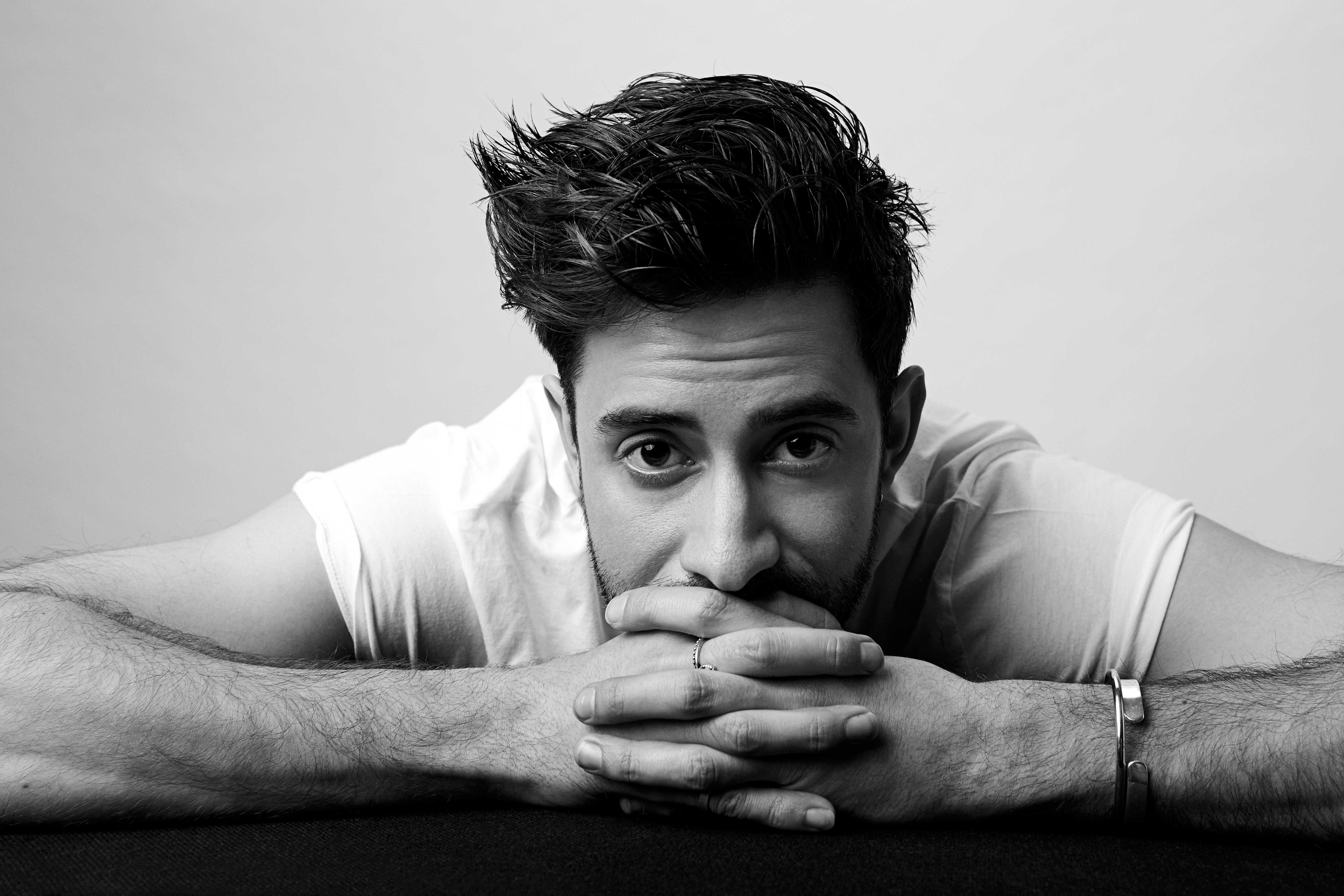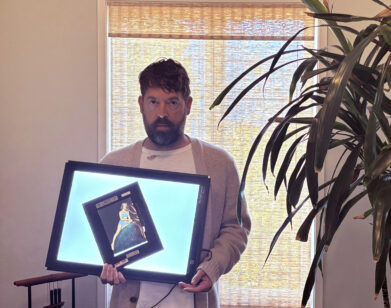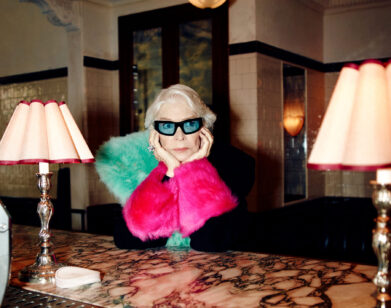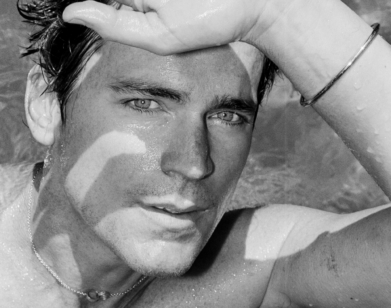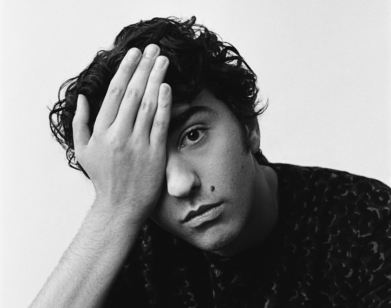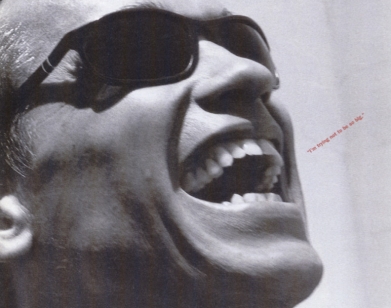Bruno Major’s music is designed to make you cry
The music of 29-year-old English musician Bruno Major is designed to make you cry. His debut album A Song For Every Moon is a syllabus of heartbreak and sadness that could squeeze a tear out of the most hardened soul. “I have cried writing [my songs] quite often,” Major says over the phone. “Normally that’s when you know you’ve got a good one.”
In fact, while writing, Major employs a sort of “cry test.” “I just get a lump in my throat [while writing],” he confesses. “I don’t cry actual tears, but I have done previously.” With his roomy falsetto and pulpy guitar riffs, Major knows how to surface deep-rooted emotions in his listener. One of his tracks, “On Our Own,” was written after his grandmother passed away. He was in the room with her right after she died, and felt the warmth leave her hands. It called into question his belief in a higher power. “I wasn’t sure whether I believed in God or not,” he recalls. “I [was] agnostic, and after [her death] I became an atheist I suppose. That song described my feelings about existentialism, God, and all of that stuff, in the pace of hearing it in a song. It was actually one of those moments where I wrote the song and then I came back to it and I was like, ‘Oh, that’s what I feel.’”
He uses his songs as exploratory vessels for feelings, which is why each one packs such a gut punch.
Music runs in his family, too. Major’s brother, Dot, is one third of indie pop band London Grammar. His father was a guitarist, and he grew up in England’s “cultural vacuum” of Northampton (pop. 212,100). He moved to London in 2011, and it was there that he wrote his first song. Struggling to find anyone to sing it, Major decided to lay down vocals himself. He realized it wasn’t awful, and repeated the process. Bypassing the traditional route of single-album-tour, Major released one song per month beginning in August 2016. The results became A Song For Every Moon, a collection of 12 tracks aching with melancholy, hope and simmering heartbreak.
TAYLOR: You grew up in Northampton. Was it diverse there?
MAJOR: No, dude, it was the opposite. I’ve referred to it in the past as a cultural vacuum. But that’s what it felt like. It was very small town, very white, and I didn’t actually write a song until I moved to London. I think when I moved to the city I was just so inspired by the different cultures that were there and the energy.
TAYLOR: Your brother Dot is also a musician. Did you guys jam together growing up?
MAJOR: Yeah, he’s in a band called London Grammar. We were always in bands together as kids. My dad, he’s a guitar player, so there were always musicians. We had a piano, there was always guitar playing around. It was a musical household.
TAYLOR: Who taught you how to play guitar?
MAJOR: I had a few teachers as a kid but my first guitar teacher was a wonderful woman called Sue. She was really inspiring and an amazing player, I used to love just listening to her play. She could play the guitar with her eyes closed. It was the coolest thing I’d ever seen.
TAYLOR: What was your go-to song when you were growing up to play on the guitar?
MAJOR: When I was a kid? Weirdly enough, the first CD I ever had was Tubular Bells by Mike Oldfield. Do you know what that is?
TAYLOR: I have no idea what that is.
MAJOR: Have you seen The Exorcist [1973]?
TAYLOR: Yeah, of course.
MAJOR: Yeah, you know the theme tune. [sings tune] That’s “Tubular Bells,” it’s taken from this weird progressive, prog composition and I used to listen it every night before I went our sleep. And there was this really loud guitar solo halfway through, like 20 minutes, and I would always wake up when that came in.
TAYLOR: So you went to bed every night listening to The Exorcist theme tune?
MAJOR: [laughs] Yeah. That’s the creepiest thing I’ve ever heard, but yeah, it’s totally true. It sounds hilarious. I was going to say, I didn’t know it was The Exorcist theme tune.
TAYLOR: Did you ever play guitar for a girl you were trying to woo?
MAJOR: No, dude, I find that kind of stuff so horrible. I have been forced a few times by a girlfriend, but I’d rather not.
TAYLOR: It’s got to be super awkward, no?
MAJOR: It is super awkward. I don’t know. I know it sounds weird but I don’t associate music and sexuality—they’re just so separate for me. It’s just too far removed. It’s funny because I played guitar since I was like seven years old and it wasn’t cool. When you’re seven, carrying around a guitar case isn’t cool and then suddenly you hit 16 years old and everyone is saying it’s hot because they realize that girls like it. So that was a cool moment, turning 16 and realizing, “This thing that’s always been really bland is now the coolest.”
TAYLOR: Did interest in you change then?
MAJOR: Yeah. And also I grew six inches in one summer.
TAYLOR: Were your plans just to be a session guitarist or something?
MAJOR: My plan was to be the best guitarist in the world. And then I realized that that was completely impossible and then I got the songwriting bug.
TAYLOR: Sampha talks a lot about how he never really had anyone to sing the songs he wrote, so he just sang them himself and some people were like, “Damn, you’re voice is actually good.”
MAJOR: Extremely similar situation for me. I wanted to be a songwriter and then I made these demos and people would be like, “Who’s the guys singing it?” and I was like, “Oh, it’s me!”
TAYLOR: Do you feel now like, “Okay, yeah, I’m good at this?”
MAJOR: I’m quietly confident, yeah, I think you have to be quietly confident. Ninety percent of being a songwriter is convincing yourself that what you’re doing isn’t shit. Otherwise, everything you’re doing is a downer and you could be writing a really great song. But if your mental state isn’t one of confidence then you’ll believe that it’s bad and you’ll fail halfway through the creative process.
TAYLOR: I heard that you used to be a wedding singer.
MAJOR: [laughs] I did, yeah. I did so much. I played Frank Sinatra tunes in Italian restaurants. I’ve played at weddings. I taught guitar. I did whatever I could to earn money for two years after I left college.
TAYLOR: Was that ever awkward, singing people’s weddings?
MAJOR: Yeah. There were some pretty funny situations but I used to play three nights a week in Italian restaurants for like £50 and a bowl of pasta.
TAYLOR: No way, they’d give you pasta too?!
MAJOR: They’d pay me £50 and give me a bowl of like undercooked gnocchi with some parmesan sauce on it.
TAYLOR: What restaurant was this?
MAJOR: Oh dude, I’m not going to drop names.
TAYLOR: I hope it’s not like Jamie’s Italian or something.
MAJOR: Oh, no. Oh dude, it wasn’t that upmarket, are you kidding me? I bet Jamie Oliver paid you to do this just now.
TAYLOR: [laughs] Your songs seem to be very personal but I wonder how you feel about monetizing your strife?
MAJOR: [laughs] That’s so funny! How do I feel about “monetizing my strife?” Well, Trey, I believe that monetizing one’s strife is essentially what it is to be an artist—how about that? What it is to be an artist is to stand in the middle of Times Square with no clothes on and everyone knowing exactly how big your penis is. There’s no hiding. And actually, if you’re afraid to say something then it normally means that’s the right line. Because that’s what people cling onto, that’s what people like in music. It explains the feelings that they have better than they can explain it themselves.
TAYLOR: Can you tell me about “Places We Won’t Walk?”
MAJOR: Yeah. I wrote that song when I was going through a break up, a break up song. And then my uncle had, it was his favorite song from A Song For Every Moon, and he had booked a ticket to come and see my show, and then he passed away a week before the show so he couldn’t come. The funeral was on the day of the show, so I couldn’t go to his funeral. The whole thing was sad. But my family surprised me and they got this minibus all the way down to London from the funeral. They turned up and I realized, as I was playing “Places We Won’t Walk,” that the whole lyric had a totally different meaning and could be interpreted a totally different way. And actually it was way more profound than the meaning I’d originally intended.
TAYLOR: So did the song’s meaning change for you as well then? Do you hear it now and think about your uncle more than your ex-girlfriend?
MAJOR: One hundred percent. Yeah. Every time I play it I think of that.
TAYLOR: Is it strange that it reminds me of the song “When Somebody Loved Me” from Toy Story 2 [1999]?
MAJOR: Not at all, because [Toy Story composer] Randy Newman is my hero. I’ve listened to every song he’s ever written. I’ve absorbed his music and I would say he’s probably my biggest influence. So I’m not surprised.
TAYLOR: Have you just been dumped and had people die your whole life?
MAJOR: Yeah, no, I’ve been dumped a few times but you know everyone’s been dumped and everyone has loved ones that pass away. Unfortunately. I mean, I’m sure there’s somebody who’s never been dumped.
TAYLOR: Too true. Do you ever just want to throw it all away and write a chart topping bop that makes the gays scream?
MAJOR: [laughs] I mean, if one of my songs became a chart topper I wouldn’t complain but it’s definitely not my goal, no.
TAYLOR: Where do you go from here?
MAJOR: I’ve written another album. I almost feel now that I can’t just make a normal album. I want to do something special with every album that I do now. So it’s a question of finding that concept.
TAYLOR: Also you’re going to be opening for Sam Smith?
MAJOR: Yeah. I’m actually at JFK now, we’re getting a flight to London, then we’ve got a week off then we go straight into an arena tour with Sam.
TAYLOR: Wow. How does that make you feel?
MAJOR: I’m super excited about it, man. I’ve definitely never played venues that big before, so I don’t really know what it’s going to be like. I just hope people listen.
TAYLOR: Do you feel like you’re on the precipice of something big?
MAJOR: I mean, to be honest, [my life] already has drastically changed. The idea of being able to travel around America and do a sold out tour—my entire American tour was sold out, every show—and that is just the most amazing thing. I never dared to dream that I would get this far, so in away I’m not too worried about what’s happening. I just want to keep making music that I’m proud of.
A SONG FOR EVERY MOON IS AVAILABLE TO STREAM NOW.

